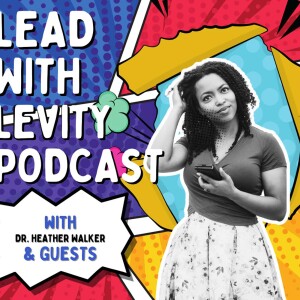
The Magic of Facilitation: Unveiling the Art and Science with Dr. Myriam Hadnes
 2024-07-08
2024-07-08
Send us a text
In this episode, Dr. Heather Walker delves into the fascinating world of facilitation with Dr. Myriam Hadnes—a behavioral economist and self-proclaimed facilitation evangelist. This conversation uncovers the essence of facilitation, its impact in various environments, and practical strategies to enhance group interactions. If you're a leader, project manager, or simply someone interested in understanding the dynamics of group facilitation, read on as we pull back the curtain on this 'Wizard of Oz’ of workplace skills.
The Core Skills of Facilitation
Facilitation requires a strategic blend of skills:
- Sensitivity to group dynamics
- Communication proficiency
- Idea synthesis
- Behavioral observation and response
Dr. Walker shares her own experiences with facilitation, debunking the myth that effective facilitation is a natural-born talent. Instead, she emphasizes that it is a skill honed through practice and critical reflection.
Facilitation in the Workplace
Facilitation is not limited to designated roles; it’s a daily practice for many, even without their realizing it. From team leaders fostering collaborative atmospheres to project managers synchronizing team efforts, facilitation is integral. Dr. Hadnes explains that facilitation skills overlap significantly with leadership skills, like asking insightful questions, active listening, and encouraging participation from quieter team members.
Creating Psychological Safety
A key takeaway from the discussion is the importance of psychological safety in facilitation. Originating from Amy Edmondson's research, psychological safety is shown to distinguish high-performing teams from mediocre ones. Facilitators must cultivate environments where team members feel safe to share, question, and challenge without fear of retribution. This safety promotes authenticity, vulnerability, and ultimately, better communication and collaboration.
The Journey to Becoming a Facilitator
Dr. Hadnes’s personal journey into facilitation was indirect—the realization of her facilitative role came much later. Her background in academia and her experiences with organizational change positioned her uniquely to embrace and advocate for facilitation. Her story resonates with many who find themselves facilitating without initially identifying as a facilitator.
Case Study: Transforming Sarah's Leadership
A case study in facilitation involves Sarah, a manager in a manufacturing plant who struggles with workplace dynamics. Dr. Hadnes advises beginning with empathy, emphasizing the importance of sharing burdens and encouraging team ownership. Effective meeting management and fostering open communication are key strategies to transforming Sarah’s leadership style.
Conclusion
Facilitation is a powerful tool in fostering effective communication, collaboration, and psychological safety within teams. Dr. Myriam Hadnes’s insights provide a valuable blueprint for anyone looking to enhance their facilitation skills, whether in the workplace, academic settings, or personal gatherings. As we embrace the nuanced art and science of facilitation, we open doors to more meaningful, productive, and enjoyable interactions.
For those interested in diving deeper into facilitation, Dr. Hadnes’s community “Never Done Before” offers a platform to explore and experiment with facilitation techniques. Her collective book project, "A Simple Guide on How to Save the World through Facilitation," promises further insights into
Support the show
Did you have any lightbulb moments while listening? Share it with us on Instagram @leadwithlevity or visit our website leadwithlevity.com so we can talk about it!
More Episodes
 2021-07-19
2021-07-19
 2021-07-05
2021-07-05
 2021-04-26
2021-04-26
 2021-02-01
2021-02-01
Create your
podcast in
minutes
- Full-featured podcast site
- Unlimited storage and bandwidth
- Comprehensive podcast stats
- Distribute to Apple Podcasts, Spotify, and more
- Make money with your podcast
It is Free
- Privacy Policy
- Cookie Policy
- Terms of Use
- Consent Preferences
- Copyright © 2015-2024 Podbean.com




